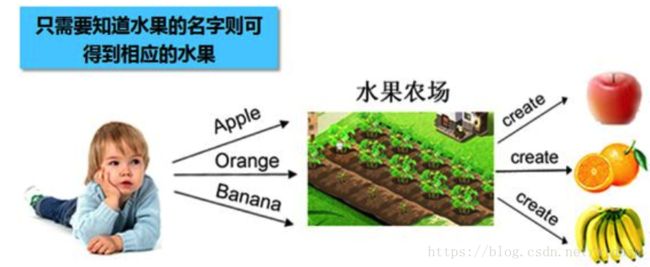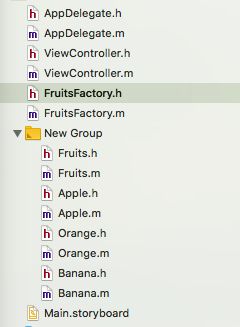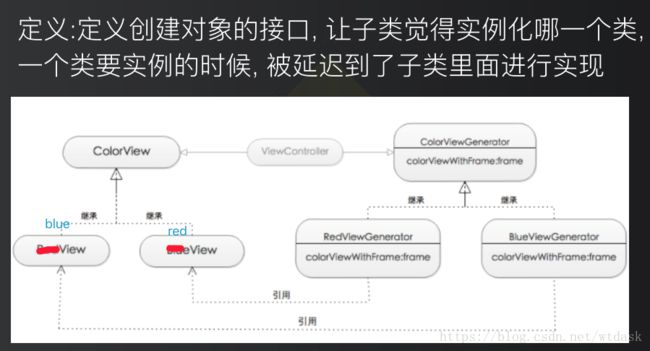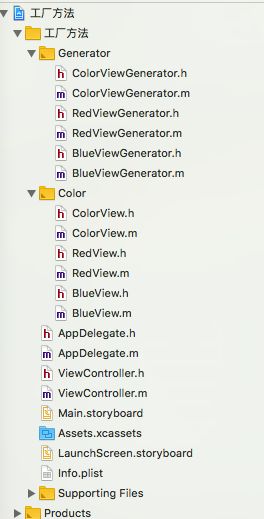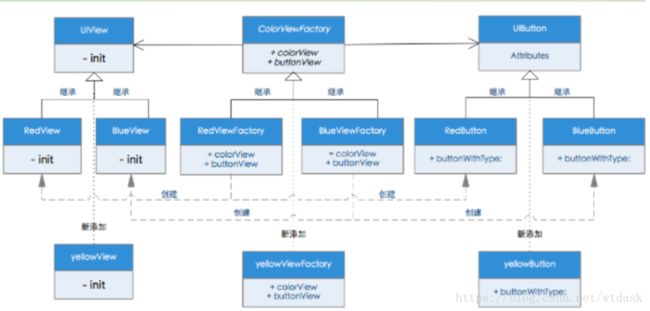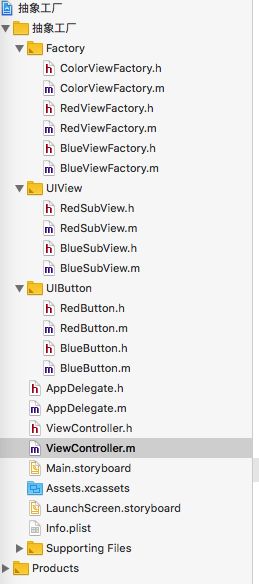iOS架构师_工厂模式
简单工厂:
创建水果工厂类FruitsFactory
再创建水果类Fruits,以及Fruits的子类Apple,Orange,Banana
FruitsFactory.h
#import FruitsFactory.m
#import "FruitsFactory.h"
@implementation FruitsFactory
+ (Fruits *)fruitsFactory:(FruitsType)type {
// 创建空的对象.在工厂方法里面进行水果的制造
Fruits *fruits = nil;
switch (type) {
case kApple:
fruits = [[Apple alloc] init];
break;
case kOrange:
fruits = [[Orange alloc] init];
break;
case kBanana:
fruits = [[Banana alloc] init];
default:
break;
}
return fruits;
}
@endFruits.h
#import
@interface Fruits : NSObject
- (void)sweet; /**< 甜 */
- (void)poorTaste; /**< 不好吃 */
@end Fruits.m
#import "Fruits.h"
@implementation Fruits
- (void)sweet {}
- (void)poorTaste {}
@endApple.h
#import "Fruits.h"
//遵循了开闭原则
@interface Apple : Fruits
- (void)freshApple; /**< 新鲜的苹果 */ // 开闭原则
@endApple.m
#import "Apple.h"
@implementation Apple
// 甜
- (void)sweet {
NSLog(@"Apple 非常甜");
}
// 不好吃
- (void)poorTaste {
NSLog(@"Apple 不好吃");
}
// 新鲜的苹果
- (void)freshApple {
NSLog(@"Apple 新鲜的苹果");
}
@endOrange.h
#import "Fruits.h"
@interface Orange : Fruits
- (void)acidOrange; /**< 酸橘子 */
@endOrange.m
#import "Orange.h"
@implementation Orange
// 甜
- (void)sweet {
NSLog(@"Orange 非常甜");
}
// 不好吃
- (void)poorTaste {
NSLog(@"Orange 不好吃");
}
/**< 酸橘子 */
- (void)acidOrange {
NSLog(@"Orange 有点酸");
}
@endBanana.h
#import "Fruits.h"
@interface Banana : Fruits
@endBanana.m
#import "Banana.h"
//遵循了里氏替换原则
@implementation Banana
// 甜
- (void)sweet {
NSLog(@"Banana 非常甜");
}
// 不好吃
- (void)poorTaste {
NSLog(@"Banana 不好吃");
}
@endViewController.m调用水果工厂类,通过工厂类创建我们需要的对象
#import "ViewController.h"
#import "FruitsFactory.h"
@interface ViewController ()
@end
@implementation ViewController
- (void)viewDidLoad {
[super viewDidLoad];
// 在水果工厂里面创建出苹果
Fruits *fruits = [FruitsFactory fruitsFactory:kApple];
[fruits sweet];
// 在水果工厂里面创建出苹果, 调用私有的方法
Apple *apple = (Apple *)[FruitsFactory fruitsFactory:kApple];
[apple freshApple];
// 在水果工厂里面创建出橘子, 调用私有的方法
Orange *orange = (Orange *)[FruitsFactory fruitsFactory:kOrange];
[orange acidOrange];
}
@end工厂方法
结构图
创建ColorViewGenerator,并且创建继承自ColorViewGenerator的子类RedViewGenerator,BlueViewGenerator
创建ColorView类,并且创建继承自ColorView的子类:RedView,BlueView
ColorViewGenerator.h
#import ColorViewGenerator.m
#import "ColorViewGenerator.h"
@implementation ColorViewGenerator
- (ColorView *)colorViewWithFrame:(CGRect)frame {
return [[ColorView alloc] initWithFrame:frame];
}
@endGenerator 相当于一个工厂
RedViewGenerator.h
#import "ColorViewGenerator.h"
#import "RedView.h"
@interface RedViewGenerator : ColorViewGenerator
@endRedViewGenerator.m
#import "RedViewGenerator.h"
@implementation RedViewGenerator
- (ColorView *)colorViewWithFrame:(CGRect)frame {
return [[RedView alloc] initWithFrame:frame];
}
@endBlueViewGenerator.h
#import "ColorViewGenerator.h"
#import "BlueView.h"
@interface BlueViewGenerator : ColorViewGenerator
@endBlueViewGenerator.m
#import "BlueViewGenerator.h"
@implementation BlueViewGenerator
- (ColorView *)colorViewWithFrame:(CGRect)frame {
return [[BlueView alloc] initWithFrame:frame];
}
@endColorView.m
#import "ColorView.h"
@implementation ColorView
- (instancetype)initWithFrame:(CGRect)frame {
self = [super initWithFrame:frame];
if (self) {
[self setBackgroundColor:[UIColor grayColor]];
}
return self;
}
@endRedView.m
#import "RedView.h"
@implementation RedView
- (instancetype)initWithFrame:(CGRect)frame {
self = [super initWithFrame:frame];
if (self) {
self.backgroundColor = [UIColor redColor];
UIImage *backgroundImage = [UIImage imageNamed:@"tupian"];
UIImageView *backgroundView = [[UIImageView alloc] initWithImage:backgroundImage];
[self addSubview:backgroundView];
}
return self;
}
@endBlueView.m
#import "BlueView.h"
@implementation BlueView
- (instancetype)initWithFrame:(CGRect)frame {
self = [super initWithFrame:frame];
if (self) {
self.backgroundColor = [UIColor blueColor];
UIImage *backgroundImage = [UIImage imageNamed:@"tupian2"];
UIImageView *backgroundView = [[UIImageView alloc] initWithImage:backgroundImage];
[self addSubview:backgroundView];
}
return self;
}
@endViewController.m调用
#import "ViewController.h"
#import "ColorViewGenerator.h"
#import "RedViewGenerator.h"
#import "BlueViewGenerator.h"
@interface ViewController ()
@end
@implementation ViewController
- (void)viewDidLoad {
[super viewDidLoad];
// Do any additional setup after loading the view, typically from a nib.
// 1.创建一个工厂类
ColorViewGenerator *colorGen = [[RedViewGenerator alloc] init];
CGRect rect = CGRectMake(0, 0, 300, 600);
ColorView *red = [colorGen colorViewWithFrame:rect];
// 添加
[self.view addSubview:red];
ColorViewGenerator *colorGen2 = [[BlueViewGenerator alloc] init];
CGRect rect2 = CGRectMake(300, 600, 50, 50);
ColorView * blue = [colorGen2 colorViewWithFrame:rect2];
[self.view addSubview:blue];
}
@end工厂方法:对多个产品抽象
抽象工厂
抽象工厂方法:对工厂抽象
抽象工厂UML图
代码示例:
新建继承自NSObject的类ColorViewFactory
ColorViewFactory.h
#import ColorViewFactory.m
#import "ColorViewFactory.h"
@implementation ColorViewFactory
+ (UIView *)colorView {
return nil;
}
// 生产蓝色的UIButton
+ (UIButton *)buttonView {
return nil;
}
@end创建继承自ColorViewFactory的RedViewFactory和BlueViewFactory
RedViewFactory.m
#import "RedViewFactory.h"
#import "RedButton.h"
#import "RedSubView.h"
@implementation RedViewFactory
+ (UIView *)colorView {
return [[RedSubView alloc] init];
}
+ (UIButton *)buttonView {
return [RedButton buttonWithType:UIButtonTypeCustom];
}
@end子类实现父类的抽象方法
BlueViewFactory.m
#import "BlueViewFactory.h"
#import "BlueButton.h"
#import "BlueSubView.h"
@implementation BlueViewFactory
+ (UIView *)colorView {
return [[BlueSubView alloc] init];
}
+ (UIButton *)buttonView {
return [BlueButton buttonWithType:UIButtonTypeCustom];
}
@end创建继承自UIView的RedSubView和BlueSubView
RedSubView.h
RedSubView.m
#import "RedSubView.h"
@implementation RedSubView
- (instancetype)init
{
self = [super init];
if (self) {
self.frame = CGRectMake(0, 0, 100, 100);
self.backgroundColor = [UIColor redColor];
}
return self;
}
@endBlueSubView.h
BlueSubView.m
#import "BlueSubView.h"
@implementation BlueSubView
- (instancetype)init
{
self = [super init];
if (self) {
self.frame = CGRectMake(0, 0, 100, 100);
self.backgroundColor = [UIColor blueColor];
}
return self;
}
@end创建继承自UIButton的RedButton和BlueButton
RedButton.h
RedButton.m
#import "RedButton.h"
@implementation RedButton
+ (instancetype)buttonWithType:(UIButtonType)buttonType {
[super buttonWithType:buttonType];
RedButton *btn = [[RedButton alloc] initWithFrame:CGRectMake(0, 100, 300, 30)];
[btn setTitle:@"红色" forState:UIControlStateNormal];
btn.titleLabel.backgroundColor = [UIColor redColor];
btn.titleLabel.textAlignment = NSTextAlignmentCenter;
return btn;
}
@endBlueButton.h
BlueButton.m
#import "BlueButton.h"
@implementation BlueButton
+ (instancetype)buttonWithType:(UIButtonType)buttonType {
[super buttonWithType:buttonType];
BlueButton *btn = [[BlueButton alloc] initWithFrame:CGRectMake(0, 100, 300, 30)];
[btn setTitle:@"蓝色" forState:UIControlStateNormal];
btn.titleLabel.backgroundColor = [UIColor redColor];
btn.titleLabel.textAlignment = NSTextAlignmentCenter;
return btn;
}
@endViewController.m
#import "ViewController.h"
#import "RedViewFactory.h"
#import "BlueViewFactory.h"
@interface ViewController ()
@end
@implementation ViewController
- (void)viewDidLoad {
[super viewDidLoad];
UIView *red = [RedViewFactory colorView];
UIButton *btn = [RedViewFactory buttonView];
[self.view addSubview:btn];
[self.view addSubview:red];
}
@end总结:
抽象工厂
1. 通过对象组合创建抽象产品
2. 创建多个系列产品
3. 必须修改父类的接口才能支持新的产品
工厂方法
1.通过类继承创建抽象产品
2.创建一种产品
3.子类化创建并重写工厂方法来创建新产品
工厂方法: 多个产品抽象 抽象工厂: 是对工厂抽象
